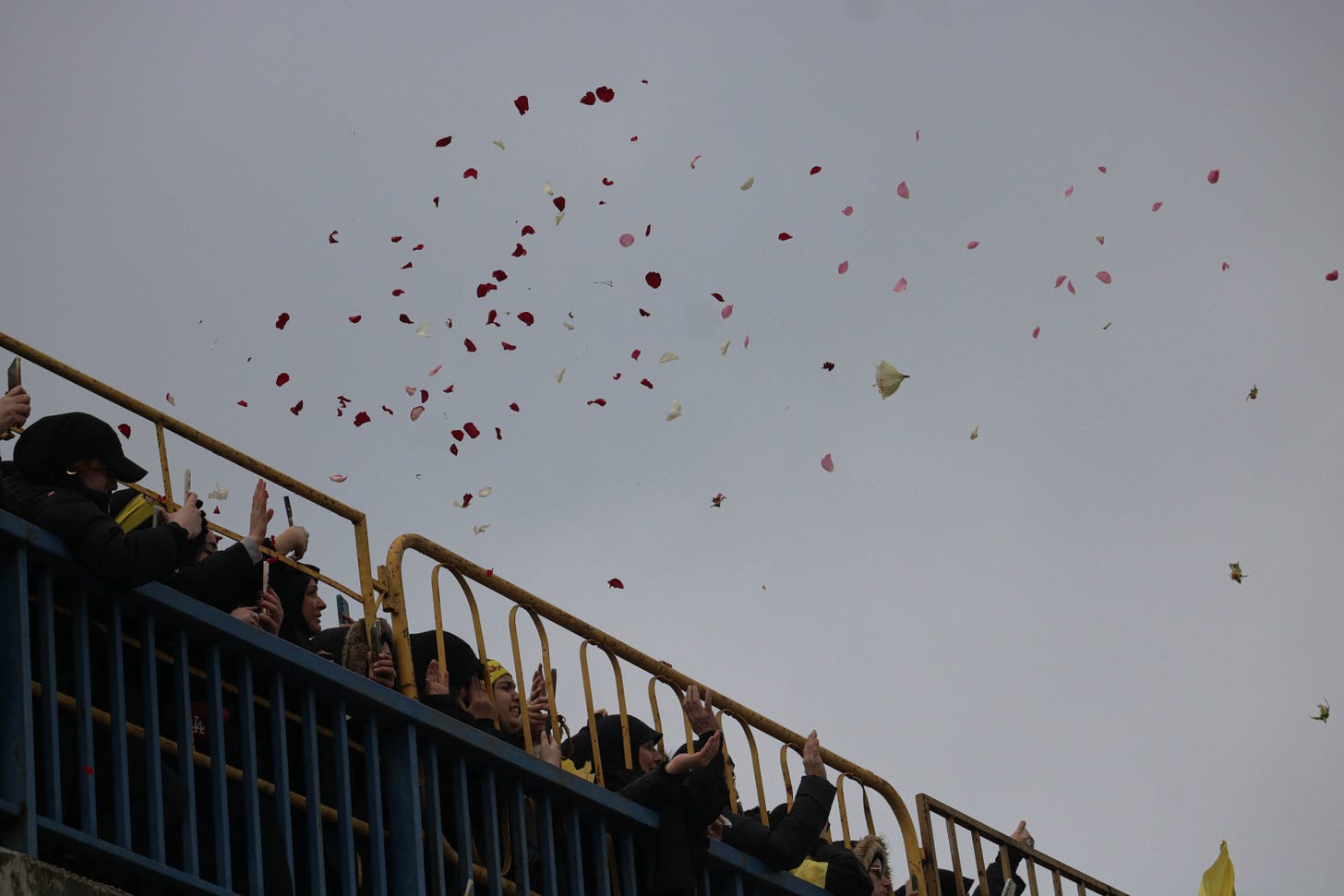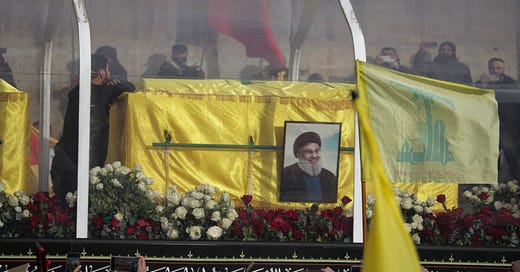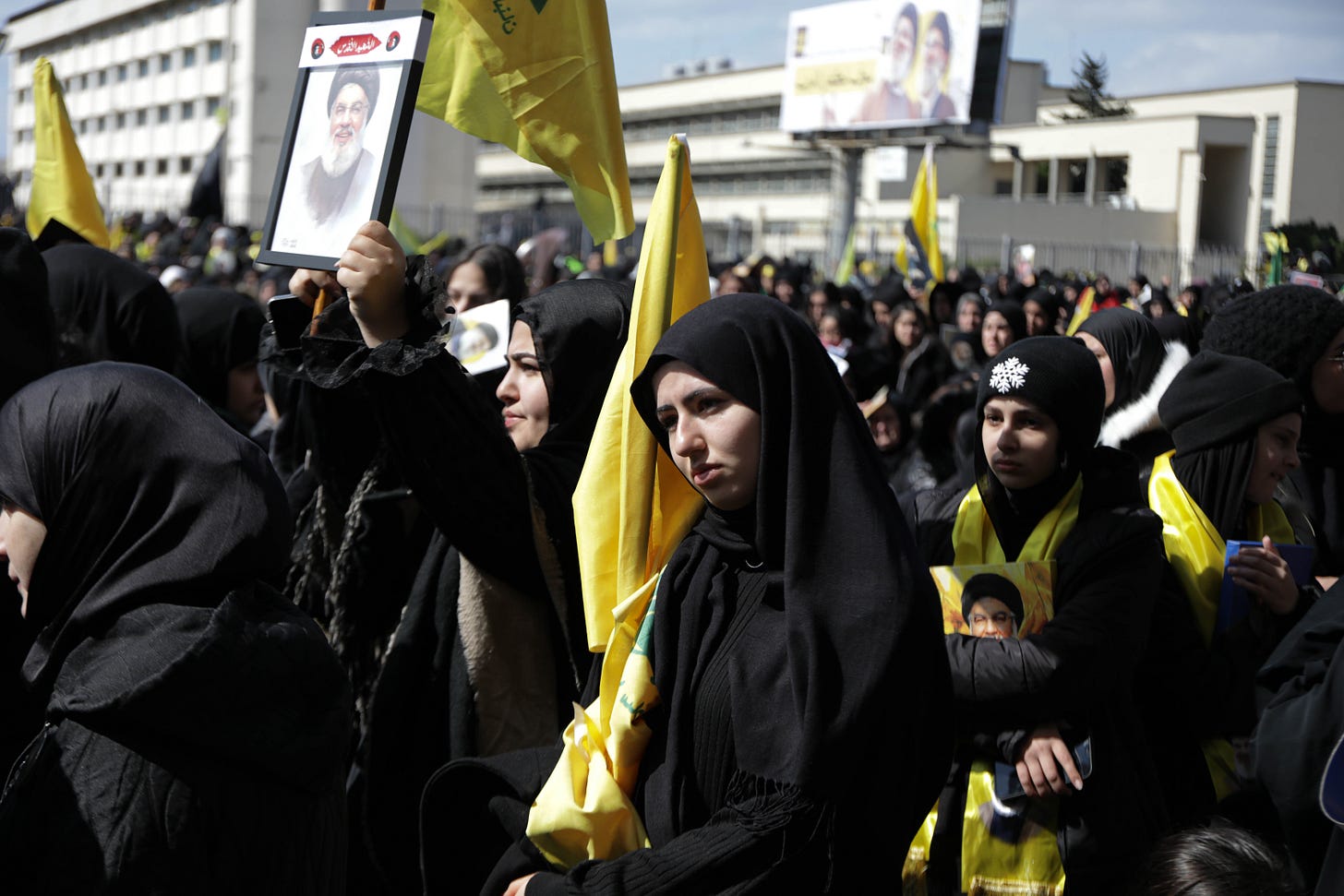The funeral of Hassan Nasrallah
After leading the party for over three decades, Hezbollah finally held a funeral for the slain leader months after his assassination in an event full of emotion amid an uncertain future for the party.
There was not a dry eye in sight.
Men, women and children all openly sobbed for the Sayyed as his casket was pulled along the highway to his final resting place.
For Shia in Lebanon and abroad, the death of Hassan Nasrallah, the longtime leader of Hezbollah, was tantamount to the death of a beloved father who died suddenly.
People threw flowers and rice towards the procession as a symbol of love. They threw scarves so that they could have something that “touched” him, anointing Nasrallah to a sort of sainthood. They shouted and begged for him to return to them.
For his supporters, Nasrallah was not simply the head of Lebanon’s most powerful political party. Nor was he just the leader of the maqawama (resistance). He was their leader. The man who represented them and helped to ensure that the Shia of Lebanon were not relegated to third-class citizens. He was a man above politics. A descendant of the Prophet Mohammad. A spiritual leader. A figurehead not just for the Shia of Lebanon, but for people throughout the region.
“This is a huge event for the Shia community in Lebanon and elsewhere because Nasrallah wasn’t just a Lebanese politician or a Lebanese cleric; he was a regional figurehead,” Nicholas Blanford, a nonresident senior fellow at the Atlantic Council’s Rafik Hariri Center, told Shafet Ahwe in the days leading up to the funeral.

‘A massive blow’
During its most recent war with Israel, Hezbollah suffered many losses from the deaths of most of its political and military leadership to the destruction caused to its infrastructure throughout the country.
But few losses were felt in Lebanon’s Shia community like the assassination of Hassan Nasrallah on Sept. 27.
While at that point it was clear that a full-scale war had become all but inevitable, especially following the pager and walkie-talkie bombings, few believed that Nasrallah would actually be targeted by Israel despite what they have said for years.
Then, on the evening of Sept. 27, dozens of bunker-buster bombs were dropped by Israeli jets on an area in Beirut’s southern suburbs. Soon after, Israel revealed the name of its target: Hassan Nasrallah, the secretary-general of Hezbollah.
According to the Israelis, Nasrallah was in Hezbollah’s main underground command bunker where he was overseeing the party’s war efforts. Because he was so deep underground, Israel did not want to leave it to chance and dropped upwards of 80 bombs that shook the Lebanese capital and its surroundings. For many, it felt like the bombs were hitting their street with windows and doors shaking violently.
Israel claimed that they had successfully killed Nasrallah but many were skeptical. Israel had previously claimed to have killed commanders in Hezbollah only for them to have narrowly escaped death. However, any lingering skepticism was put to rest a few days later when Hezbollah put out its own statement: Hassan Nasrallah was “martyred on the road to Jerusalem.”

In order to understand the impact that Nasrallah’s death had on Lebanon’s Shia community, Blanford explained, it helps to put it into perspective by comparing it to another deeply beloved figure for the community: his predecessor, Abbas al-Mousawi, in a 1992 assassination by Israel.
“Abbas al-Mousawi was the leader of the Islamic Resistance since the 1980s and he became the secretary-general in ’91 and this guy was revered by the Hezbollah cadres. They worshiped him and his death was a major, major morale blow to the organization. His assassination actually triggered developments that began to change the battlefield in south Lebanon which, at the time, the Israelis were occupying of course,” Blanford said.
“In response, Hezbollah fired rockets into Israel for the first time and they hadn’t done that before. The month after Mousawi was killed, the Israelis lost an embassy in Buenos Aires. The third main fact is that two days after Mousawi was killed, the Shura Council elected Nasrallah.”
At the time that he was elected, Nasrallah was not particularly well-known. In fact, with his characteristic lisp, initially, he was not viewed as necessarily being a strong leader. But he was, in effect, Mousawi’s protégé and studied under him at the seminaries in Najaf and was seen as a suitable replacement for Mousawi.
As the years went by, Nasrallah, through his fiery speeches that expertly interwove religious iconology and humor, came to surpass Mousawi in his standing not just amongst Lebanon’s Shia but in the region as a whole.
“Nasrallah came to surpass Mousawi in stature and become this huge regional figure, very charismatic figure and so on,” Blanford stated. “It’s a massive blow not just to Hezbollah but the Shia community in general which is why many Shias are simply not believing that he is dead. That he will turn up again sort of like a ‘hidden imam’ concept like Musa al-Sadr.”

The funeral
Few expected Nasrallah’s funeral to be anything but massive.
The largest funeral Lebanon had ever seen previously was in 2005 following the assassination of former Prime Minister Rafik Hariri.
That funeral was attended by roughly 150,000 people from all different sects, a clear indication of the widespread love for the former prime minister.
While mainly being attended by Shia, Nasrallah’s funeral saw roughly a million in attendance according to initial estimates with the surrounding streets being filled to the brim with people. Even several kilometers down the road from where the initial funeral was taking place, it was still packed with attendees.
This was in large part due to who Nasrallah was for so many people but it was also extremely important for Hezbollah to ensure that there was massive attendance.
“On the political side of this, Hezbollah will want to make this a popular referendum that the Shia community is still tightly bound to Hezbollah, still supporting Hezbollah,” Blanford explained.
The recent war with Israel proved to be a massive setback for Hezbollah. On top of that, its land corridor with Iran was lost after Bashar al-Assad was overthrown on Dec. 8, 2024 in an unexpected rebel offensive.
Then, a month later, Joseph Aoun was elected president of Lebanon after more than two years of deadlock and Nawaf Salam, largely seen as being a reformer, was tapped as prime minister.
With all of these developments, questions started to arise about the party and whether or not it was still the same powerhouse that it had been for years prior.
“They’ve not only lost their leadership – political and military – they lost a battle against the Israelis. They’ve lost Syria with the Assad regime gone. So, it is a time for pause and reflection whilst also shoring up the domestic front. So, they’ve been weakened in the context of the conflict with Israel because they’ve lost that vital deterrence factor that kept the peace between 2006 and 2023 in October because the Israelis aren’t scared of Hezbollah anymore,” Blanford said. “This is a very significant loss for Hezbollah and I don’t, frankly, know how they will be able to rebuild that deterrence at least in the short to medium term.”

Down but not out
However, despite its losses in the conflict with Israel, Hezbollah still remains a force to be reckoned with.
Rather than focusing on the conflict, Hezbollah is looking internally with a greater focus on its constituents and ensuring that they are taken care of after over a year of war – in particular by giving out $12,000 to $14,000 in cash until reconstruction begins.
They are also looking to put a stop to the talk by its political opponents who view the party as being weakened and that now is the time to disarm them.

According to Blanford, the more Hezbollah’s political opponents talk about trying to “knock them down a peg or two to weaken them,” the more Lebanon’s Shia back the party.
“There’s kind of a collective sense in the Shia community that when the other communities are ganging up on them as they see it, they feel that the other communities want to push the Shia back into being third-class citizens like they were in the first two, three decades after independence,” he said. “This brings them immediately back to Hezbollah. They all jump into the sectarian trench of Hezbollah.”
The support by the broader Shia community in Lebanon was clear during the funeral and not just by the large turnout.
At several points during the funeral, four Israeli jets flew low over the funeral in a V formation as part of an intimidation tactic. Attendees immediately responded by shouting their support for Hezbollah and Nasrallah. Not only did Israel fail to scare people into not supporting Hezbollah, but it only helped to further solidify the backing the group has long enjoyed.
Between the Israeli flyovers and the continued presence of the Israeli military in five strategic locations in south Lebanon, despite the date for the Israeli military to withdraw coming and going on Feb. 18, it only serves to ensure continued unwavering support of Hezbollah.
“We committed ourselves [to the ceasefire], but Israel did not commit itself, and Israel will not commit itself. We were patient to allow Israel to withdraw through agreement and diplomacy, and we did not violate [the ceasefire] so as not to be equal to them,” Hezbollah Secretary-General Sheikh Naim Kassem said during his speech given by video link at his predecessor’s funeral. “Today, after the deadline for the Israeli withdrawal has ended, we are no longer facing Israeli violations. We are now facing occupation and aggression.”
This idea of resistance to Israeli occupation is something that the Lebanese Shia can support without much convincing. It was this very thing that helped Hezbollah to garner so much support in the 1980s and 1990s during the initial Israeli occupation of south Lebanon.

Nasrallah’s death served as a major loss for Hezbollah and Lebanon’s Shia at large. However, his funeral proved that Hezbollah still enjoys significant support despite recent developments and that his words, which resonated so deeply with so many people over the last 30 years, will continue to echo long after he was buried.





